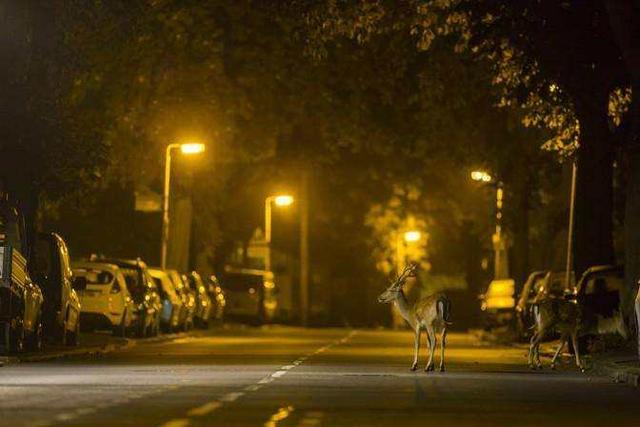
(单词翻译:单击)
听力文本
Many Animals Staying Awake at Night to Avoid People
Lions, tigers and other mammals are staying awake at night to avoid human beings, a new study finds.
Scientists have long known that human activity can lead to changes in nature. Many mammals may move around less or travel to distant places to avoid contact with people. By being awake at night, mammals can also be on guard against possible attackers and spend less time looking for food.
The latest research found even activities like hiking and camping can frighten animals and cause them to become more active at night.
Kaitlyn Gaynor of the University of California, Berkeley led the study. She said, "It suggests that animals might be playing it safe around people. We may think that we leave no trace when we're just hiking in the woods, but our mere presence can have lasting consequences."
She and her team of researchers examined 76 other studies involving 62 species on six continents. Among the animals studied were lions in Tanzania, tigers in Nepal, and otters in Brazil.
Researchers compared how much time those animals were active at night in areas of human activity, such as hunting, hiking and farming. The team found that, on average, human presence caused an increase of about 20 percent in night time activity, even in creatures that usually sleep at night.
Results were published in the journal Science.
The findings are unusual because no one else has gathered all this information and looked at it in such detail, noted Ana Benitez Lopez of Radboud University in the Netherlands. She examined the research, but was not part of the study.
Ecologist Marlee Tucker was surprised that any kind of human activity is enough for mammals to see people as a threat.
"It's a little bit scary," she said.
Tucker works at the Goethe University Frankfurt in Germany. She was not part of the study.
Kaitlyn Gaynor said the change in hours will affect animals that have already have trouble in the darkness. But she said that the changes could also help other animals reduce conflict with people.
"Humans can do their thing during the day; wildlife can do their thing at night," she said.
Gaynor added, that way, people would be sharing the planet with many other species.
I'm Jonathan Evans.
重点解析
1.human beings 人类
All human beings are much more intelligent than animals.
所有的人都比动物聪明得多。
2.guard against 堤防
He is constantly on guard against any threat of humiliation.
他时刻提防着任何有辱尊严之事。
3.on average 平均而言
On average, American firms remain the most productive in the world.
总体来讲,美国公司在全球范围内还是产值最高。
4.move around 走来走去
He stood up and began to move around the room.
他起身开始在屋里来回走动。
5.She said, "It suggests that animals might be playing it safe around people.
playing it safe 谨慎;小心翼翼
I thought I was playing it so safe.
我想我只是谨慎而为。
Not all the rich are playing it safe, of course.
当然,并非所有的富人在投资时都谨小慎微。
6.Kaitlyn Gaynor said the change in hours will affect animals that have already have trouble in the darkness.
have trouble in (doing) sth 做某事有困难
You could ask the teacher for help when you have trouble in learning English.
当你学英语有困难时,你可以向老师寻求帮助。
I have trouble in understanding the expressions on people's faces.
第二我在解析别人的面部表情是会遇到障碍。
参考译文
惧怕人类 许多动物昼伏夜出
一项最新研究发现,狮子、老虎等其他哺乳动物为了躲避人类昼伏夜出。
科学家们早就知晓人类活动会导致自然界环境的变化。为了避免与人类接触,许多哺乳动物可能会减少活动或迁移到偏远地方。哺乳动物通过夜间不眠的方式警惕可能受到的袭击,并且减少觅食的时间。
最新研究发现,即使是徒步旅行和露营等户外活动也会让动物受惊,导致其在夜间更加活跃。
加利福尼亚大学伯克利分校的凯特林·盖纳(Kaitlyn Gaynor)主导了这项研究。她说:“这表明周围有人时,动物会十分谨慎。我们可能会认为,在森林徒步旅行时不会留下任何痕迹,但是我们只是出现就会产生持久性的影响。”
凯特林和同组的研究人员调查了其他76份涉及6大洲62个物种的研究。研究对象包括坦桑尼亚的狮子、尼泊尔的老虎和巴西的水獭等。

研究人员比较了这些动物在人类活动区域(如打猎、远足和耕作)的夜间活动时间。该研究小组发现,平均来说,人类活动会导致动物在夜间活动增加约20%,即使那些通常在夜间睡觉的生物也不例外。
研究结果发表在《科学》杂志上。
荷兰内梅亨大学的安娜·贝尼特斯·洛佩兹(Ana Benitez Lopez)表示,这项发现非同寻常,因为没有人收集过全部信息并如此细致地研究过。她仔细查阅了这项研究,但她并没有参与研究过程。
生态学家玛丽·塔克(Marlee Tucker)对任何人类活动都足以让哺乳动物将人类视为威胁感到惊讶。
“这有点吓人,”她说。
塔克任职于德国法兰克福歌德大学。她没有参与这项研究。
盖纳指出,时间变化将影响到那些在夜晚活动有障碍的动物。但是她表示,这些变化有助于减少其他动物与人类的冲突。
她说“人类可以在白天活动;而野生动物可以在夜间活动。”
盖纳补充说,如此,人们就可以和许多其他物种共享地球了。
乔纳森·埃文斯为您播报。
译文为翻译,未经授权请勿转载!
